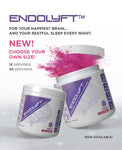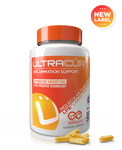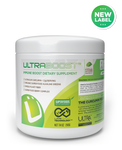Celebrated another birthday yet this year? Congrats, and count your blessings!
However, getting older does come with its attendant challenges.
With every extra candle on your birthday cake, you run a greater risk of nutrient insufficiency.
Just as it’s not as easy to run or hike a mile (or 10!) as it was at half your age, your body also must work harder at assimilating nutrients.
This may be especially true of your need for magnesium.
Magnesium: The Mineral that Keeps on Giving
Magnesium is an essential mineral. It is a co-factor in literally hundreds of essential processes in your body... 300 to 600 depending on which research you look at.
Here’s a small sampling of some of magnesium’s benefits to your body:
• Promotes sleep quality and duration, so you fall asleep and stay asleep
• Preserves muscle, instead of losing it as you age
• Promotes heart health and healthy blood pressure
• Boosts brain function and may help prevent headaches
• Needed for optimal blood sugar and insulin levels
• Involved with healthy reproduction
• Maintains detox processes
• Stimulates a healthy inflammatory response
• Reduces anxiety and depression
• Improves energy production
• Helps your body produce glutathione and improves antioxidant capacity
• Protects and preserves nerve function
Despite its many benefits to your health, studies show that roughly 75% of Americans get insufficient amounts of magnesium.

A very long list of conditions is linked to magnesium deficiency.
This includes asthma, migraines, fibromyalgia, chronic fatigue, high blood pressure, diabetes, PMS, muscle cramps, angina, insomnia, depression, anxiety, brain fog, and more.
Do any of these sound familiar?

Found in These Foods, But...
Magnesium is found in a number of foods. Unfortunately, they’re foods many people only eat occasionally, if at all.
You’ll go far toward addressing magnesium deficiency by eating the following foods frequently:
• Nuts and seeds
• Bananas – less-ripe bananas contain fewer carbs
• Avocados
• Leafy greens, including spinach
• Beans and legumes
• Brown rice
• Quinoa
• Seaweed (when did you last eat seaweed?)
• Chia seeds
The two foods with the highest concentration of magnesium are pumpkin seeds and chia seeds.

Stop Draining Your Body of Magnesium
You could be taking magnesium supplements and eating magnesium-rich foods, and still have an insufficiency if you inadvertently drain off your magnesium.
Modern life can rob you of the magnesium you actually take in.
First of all, magnesium tends to be poorly absorbed.
To add insult to injury, your magnesium levels can be rapidly depleted by alcohol, coffee, salt, soda, profuse sweating, stress, chronic diarrhea, drugs (including diuretics and antibiotics), and some types of intestinal parasites.
Add processed foods to that list too.
Finally, a status of older age, type 2 diabetes, GI diseases, and alcohol dependence are linked with reduced magnesium absorption.
Should You Supplement?
Consider supplementing if you experience any symptoms of magnesium deficiency, from muscle cramps to heart conditions.
While you can test for serum magnesium, these tests can be falsely reassuring. Your results could show up as normal, even when a deficiency exists.
Therefore, it’s important to listen to your body. If you experience symptoms of magnesium deficiency, assume that it is a magnesium deficiency.
Having said that, the magnesium supplement landscape is confusing and tricky to navigate.
Here, we’ll try to help you sort out the confusion so you can choose your best option(s).
Magnesium Primer
There are many types of magnesium. Magnesium must be bound to another substance such as salt, to be absorbed.
Hence, there’ll be two words: Magnesium + the bound substance. For example, magnesium citrate, magnesium malate, etc.
Many types of magnesium supplements are tough for the body to absorb and utilize.

Types of Magnesium -- The Good, the Bad, and the Ugly
1-2. Magnesium citrate and magnesium oxide pull water into the intestines. Consequently, they loosen your stools and can cause diarrhea. They’re also not well absorbed into the body. Unless you have constipation, avoid these types.
Magnesium oxide is the cheapest form. You’ll find it in the chain stores. It doesn’t dissolve. It’s like a rock. (Same thing is true of calcium carbonate. It’s limestone, oyster shell, and like pearly white sand.) Avoid magnesium oxide.
3. Magnesium chloride. Magnesium chloride tends to be well absorbed and may be one of the best for detoxification.
The chloride in magnesium chloride is hydrochloric acid – which the gut needs to help it absorb. Therefore, it may be one of the best, especially if you suffer from low acid levels in the gut that may hinder nutrient absorption.
4. Magnesium carbonate. When magnesium carbonate hits the gut, it combines with your stomach’s hydrochloric acid to become magnesium chloride. It absorbs reasonably well.
5. Magnesium taurate. Magnesium taurate is especially useful for those with cardiovascular problems. It can protect the heart from arterial damage and prevent arrhythmia.
It is easily absorbed with no laxative effect at all.
6. Magnesium glycinate is a chelated form of magnesium that’s well absorbed. It is bound to glycine, an amino acid. It is considered highly bioavailable and is one of the best and safest options if you suffer from long term magnesium deficiency.
It has no laxative effect and is considered the least likely form of magnesium supplement to cause diarrhea.
7. Magnesium Threonate (also called Magtein) is highly absorbable.
Magnesium Threonate crosses the blood-brain barrier. By optimizing magnesium levels in the brain, magnesium Threonate supports nerve signaling pathways and helps strengthen synaptic brain connections. There's some evidence it may be useful in treating or preventing dementia for this reason.
Magnesium Threonate was developed by researchers at MIT who were trying to find a better way to supplement with magnesium, without GI distress and diarrhea.
While magnesium Threonate is considered the best for increasing magnesium in the brain, it may not be as good for addressing overall magnesium deficiency.
8. The rest of the bad. Other types of magnesium that are not recommended, in addition to magnesium citrate and magnesium oxide, include magnesium sulfate (Epsom salt) and magnesium hydroxide (Milk of Magnesia, which has poor absorption).
In addition, avoid aspartate and magnesium glutamate at all costs. They are components of the artificial sweetener aspartame, which has a long list of reported side effects and may lead to neurotoxicity.
The Bottom Line
Since magnesium is an important co-factor for 300+ bodily functions, be sure you choose a well-absorbed type of magnesium that’ll really address your nutrient insufficiencies.
Or better yet, rotate between two or three of the best forms, maybe in the am and pm.
As always, we recommend you buy your supplements in health food stores, not in large chains and big box stores. If you have questions about a product, their teams are better equipped to help guide your purchase.
Wishing you optimal magnesium levels and a healthy energetic body!
Adam Payne




